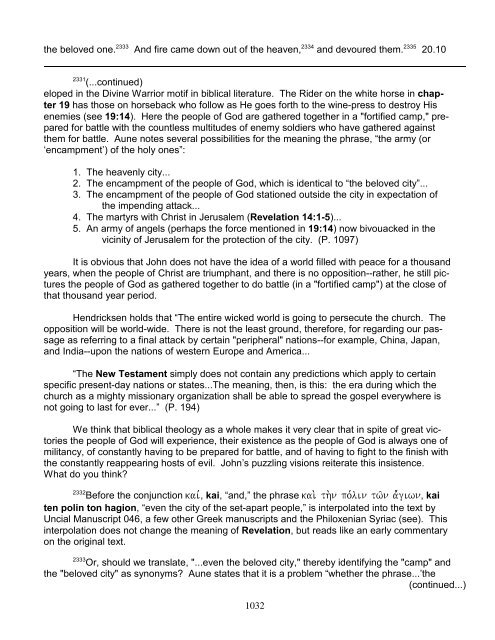Revelation 20 - In Depth Bible Commentaries
Revelation 20 - In Depth Bible Commentaries
Revelation 20 - In Depth Bible Commentaries
Create successful ePaper yourself
Turn your PDF publications into a flip-book with our unique Google optimized e-Paper software.
2333 2334 2335<br />
the beloved one. And fire came down out of the heaven, and devoured them. <strong>20</strong>.10<br />
2331<br />
(...continued)<br />
eloped in the Divine Warrior motif in biblical literature. The Rider on the white horse in chapter<br />
19 has those on horseback who follow as He goes forth to the wine-press to destroy His<br />
enemies (see 19:14). Here the people of God are gathered together in a "fortified camp," prepared<br />
for battle with the countless multitudes of enemy soldiers who have gathered against<br />
them for battle. Aune notes several possibilities for the meaning the phrase, “the army (or<br />
‘encampment’) of the holy ones”:<br />
1. The heavenly city...<br />
2. The encampment of the people of God, which is identical to “the beloved city”...<br />
3. The encampment of the people of God stationed outside the city in expectation of<br />
the impending attack...<br />
4. The martyrs with Christ in Jerusalem (<strong>Revelation</strong> 14:1-5)...<br />
5. An army of angels (perhaps the force mentioned in 19:14) now bivouacked in the<br />
vicinity of Jerusalem for the protection of the city. (P. 1097)<br />
It is obvious that John does not have the idea of a world filled with peace for a thousand<br />
years, when the people of Christ are triumphant, and there is no opposition--rather, he still pictures<br />
the people of God as gathered together to do battle (in a "fortified camp") at the close of<br />
that thousand year period.<br />
Hendricksen holds that “The entire wicked world is going to persecute the church. The<br />
opposition will be world-wide. There is not the least ground, therefore, for regarding our passage<br />
as referring to a final attack by certain "peripheral" nations--for example, China, Japan,<br />
and <strong>In</strong>dia--upon the nations of western Europe and America...<br />
“The New Testament simply does not contain any predictions which apply to certain<br />
specific present-day nations or states...The meaning, then, is this: the era during which the<br />
church as a mighty missionary organization shall be able to spread the gospel everywhere is<br />
not going to last for ever...” (P. 194)<br />
We think that biblical theology as a whole makes it very clear that in spite of great victories<br />
the people of God will experience, their existence as the people of God is always one of<br />
militancy, of constantly having to be prepared for battle, and of having to fight to the finish with<br />
the constantly reappearing hosts of evil. John’s puzzling visions reiterate this insistence.<br />
What do you think?<br />
2332<br />
Before the conjunction kai, kai, “and,” the phrase kai. th.n po,lin tw/n a` ,giwn, kai<br />
ten polin ton hagion, “even the city of the set-apart people,” is interpolated into the text by<br />
Uncial Manuscript 046, a few other Greek manuscripts and the Philoxenian Syriac (see). This<br />
interpolation does not change the meaning of <strong>Revelation</strong>, but reads like an early commentary<br />
on the original text.<br />
2333<br />
Or, should we translate, "...even the beloved city," thereby identifying the "camp" and<br />
the "beloved city" as synonyms? Aune states that it is a problem “whether the phrase...’the<br />
(continued...)<br />
1032

















